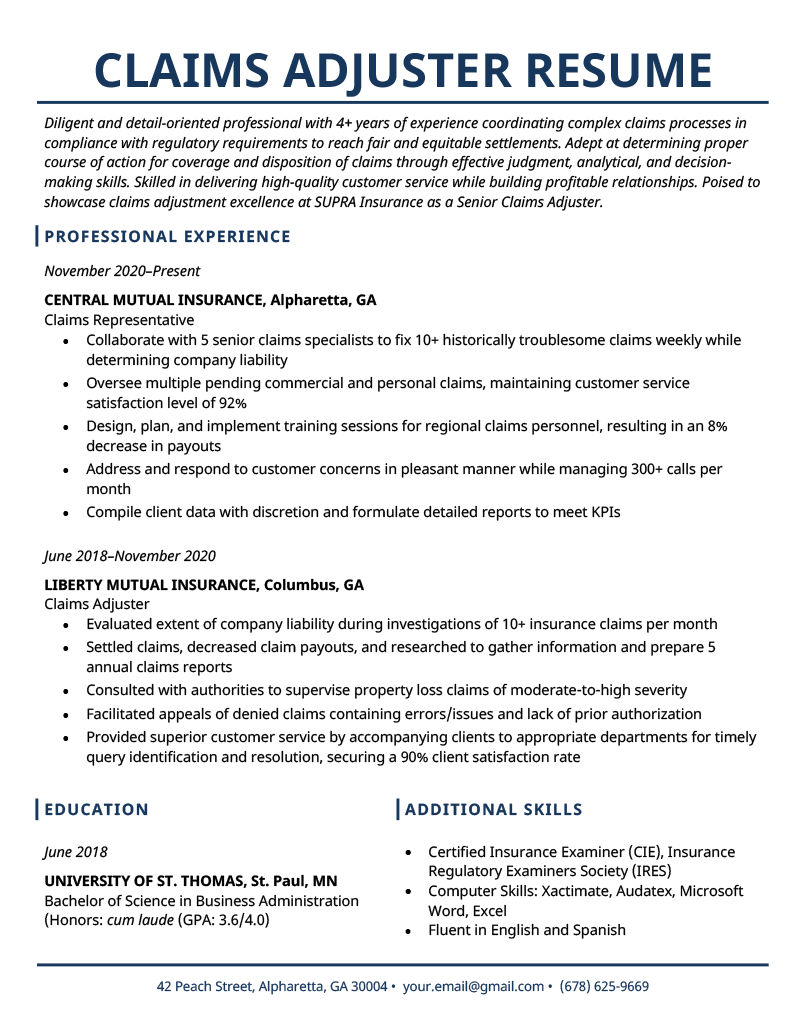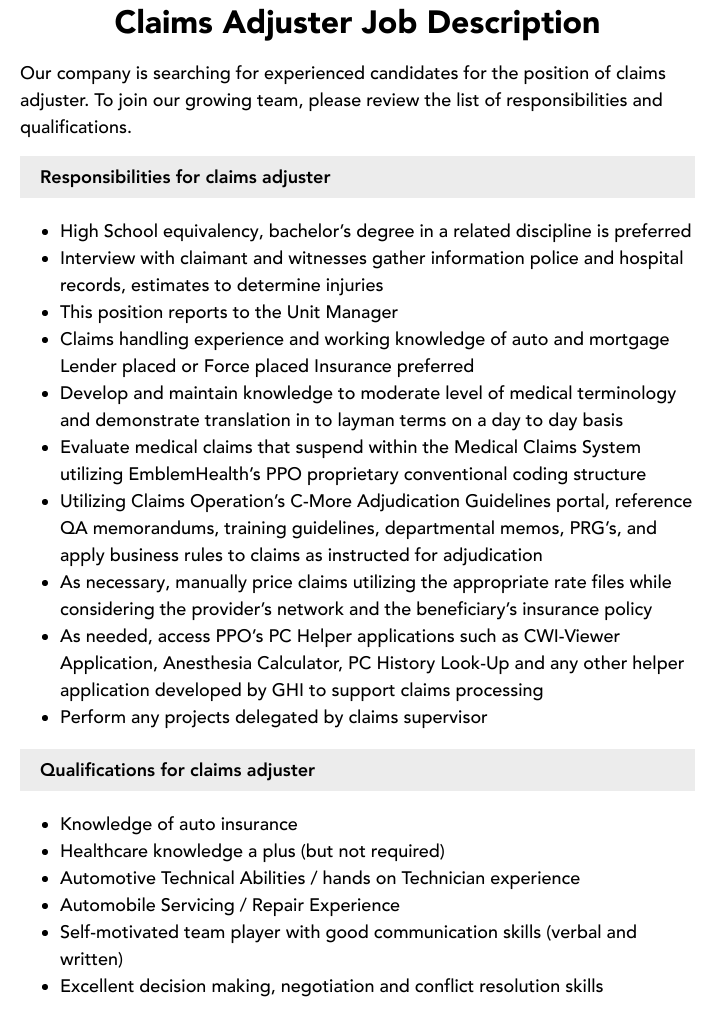
How to Start a Career in Claims Adjusting.
Are you interested in a career in claims adjusting? Wondering how to get started in this rewarding field? Look no further! This comprehensive guide will walk you through the steps and provide valuable insights on how to embark on your journey as a claims adjuster.
What is claims adjusting?
Claims adjusting is a crucial role within the insurance industry, where professionals assess and investigate insurance claims. They determine the extent of the damage or loss, negotiate settlements, and ensure fair compensation for policyholders. Adjusters work with various types of claims, including property, auto, and liability, making it a versatile and dynamic career path.
How to start your career in claims adjusting?
If you’re interested in pursuing a career in claims adjusting, it’s important to have a strong foundation in insurance knowledge. This can be achieved by obtaining relevant education and certifications. Additionally, gaining practical experience through internships or entry-level positions in the insurance industry can provide valuable insights and develop your skills. Building a solid network within the industry can also open doors to job opportunities and mentorship.
Why choose claims adjusting?
Starting a career in claims adjusting offers numerous benefits. Not only does it provide a stable and lucrative profession, but it also allows for personal growth and development. Claims adjusters have the opportunity to help others during difficult times and make a positive impact on their lives. The field is constantly evolving, offering continuous learning and advancement opportunities. Additionally, as a claims adjuster, you can work independently or as part of a team, providing flexibility in your work environment.
In conclusion, starting a career in claims adjusting can be a rewarding choice for those interested in the insurance industry. By acquiring the necessary knowledge and experience, and leveraging your personal skills and network, you can pave the way for a successful and fulfilling career in this dynamic field. So, why wait? Begin your journey in claims adjusting today!
Importance of Claims Adjusting
Starting a career in claims adjusting is a great opportunity for those who are interested in the insurance industry. Claims adjusters play a crucial role in the insurance process by evaluating and determining the validity of insurance claims.
Claims adjusters are responsible for investigating and assessing the damages or losses covered by insurance policies. They need to have strong analytical skills to gather and review relevant information, such as police reports, medical records, and witness statements. This information helps them make informed decisions about claim settlements.
In addition to their analytical skills, claims adjusters must also have excellent communication skills. They interact with policyholders, witnesses, and other professionals, such as lawyers and medical professionals, to gather information and negotiate claim settlements. They must be able to explain complex insurance terms and processes in a clear and concise manner.
Another important aspect of claims adjusting is the ability to handle stressful situations. Some claims involve accidents or natural disasters, which can be emotionally and physically challenging for the individuals involved. Claims adjusters need to demonstrate empathy while remaining objective and professional.
Overall, claims adjusting is a rewarding career that offers opportunities for growth and development. It requires a combination of analytical skills, communication skills, and the ability to handle stressful situations. By understanding the importance of claims adjusting, individuals can embark on a successful career in the insurance industry.
Skills Required for a Claims Adjuster
A career in claims adjusting requires a unique set of skills in order to be successful. Here are some of the key skills you need to develop in order to start a career in claims adjusting:
| 1. Attention to detail: | Claims adjusters must have a keen eye for detail in order to accurately assess damages, determine coverage, and verify policy information. |
| 2. Analytical thinking: | Being able to analyze information, identify patterns, and make connections is essential for a claims adjuster. This skill helps them make informed decisions about claims and settlements. |
| 3. Strong communication skills: | Claims adjusters must be able to effectively communicate with policyholders, witnesses, and other professionals. Excellent verbal and written communication skills are necessary for gathering information and documenting claims. |
| 4. Customer service: | A successful claims adjuster knows how to provide exceptional customer service. This includes being empathetic, patient, and understanding towards policyholders during the claims process. |
| 5. Negotiation: | Claims adjusters often need to negotiate settlements with policyholders, lawyers, and other parties involved. Having strong negotiation skills allows them to reach fair and equitable resolutions. |
| 6. Time management: | Being able to prioritize tasks, meet deadlines, and efficiently handle multiple claims is crucial for a claims adjuster. Effective time management skills ensure claims are processed in a timely manner. |
| 7. Technical proficiency: | Claims adjusters must be comfortable using various software programs and databases to process claims. Proficiency in Microsoft Office, claims management systems, and other industry-specific software is essential. |
Developing these skills, along with gaining knowledge and experience in the insurance industry, will help you start a successful career in claims adjusting.
Education and Training for Claims Adjusters
Starting a career in claims adjusting requires a certain level of education and training to ensure success in this field. While a specific degree may not be required, most employers prefer candidates with a high school diploma or equivalent. However, having a bachelor’s degree in a relevant field such as business or finance can provide an edge in the competitive job market.
In addition to a formal education, it is crucial for aspiring claims adjusters to undergo specific training to develop the necessary skills and knowledge for this role. Many companies offer training programs for new hires, which cover key areas such as insurance policies, claims procedures, and negotiation techniques.
Furthermore, obtaining relevant certifications can greatly enhance the prospects of a career in claims adjusting. The Institutes, an organization dedicated to providing professional education in the insurance industry, offer several designations specifically for claims adjusters, such as the Associate in Claims (AIC) and the Chartered Property Casualty Underwriter (CPCU) designations.
Claims adjusters must also possess certain qualities and skills to excel in their roles. Strong communication skills are essential as they often interact with claimants, insurance agents, and other professionals in the industry. Attention to detail, analytical thinking, and problem-solving abilities are also critical in accurately assessing claims and determining appropriate settlements.
In conclusion, while claims adjusting does not necessarily require a specific degree, having a solid education, undergoing relevant training, and obtaining industry certifications can significantly increase one’s chances of success in this career. By continuously honing their skills and staying up-to-date with industry changes, aspiring claims adjusters can position themselves for a rewarding and fulfilling professional journey.
Licensing and Certification Process
In order to start a career in claims adjusting, it is important to understand the licensing and certification process. This process is necessary to ensure that claims adjusters have the knowledge and skills required to perform their job effectively.
Firstly, it is important to obtain a license to work as a claims adjuster. The requirements for obtaining a license may vary depending on the jurisdiction you are in, so it is essential to research the specific requirements for your area.
In general, the process involves completing a pre-licensing education program, passing a licensing exam, and submitting an application along with any required fees. The pre-licensing education program provides you with the knowledge and information needed to work as a claims adjuster.
Once you have obtained your license, you may also consider obtaining additional certifications to further enhance your career prospects. The most widely recognized certification for claims adjusters is the Associate in Claims (AIC) designation, which is offered by The Institutes.
The AIC designation is earned by completing a series of courses and exams that cover various aspects of claims adjusting, including property, casualty, and liability claims. This certification demonstrates your expertise in the field and can help you stand out to potential employers.
In addition to the AIC designation, there are other certifications available that focus on specific areas of claims adjusting, such as auto claims or workers’ compensation claims. These certifications can further specialize your skills and make you more marketable in the industry.
In conclusion, the licensing and certification process is an important step in starting a career in claims adjusting. By obtaining the necessary license and certifications, you can demonstrate your knowledge and skills in the field and increase your career opportunities.
Job Prospects in Claims Adjusting
Claims adjusting offers a promising career path for individuals interested in the insurance industry. With the right skills and training, you can embark on a successful career as a claims adjuster.
Many industries rely on claims adjusters to assess insurance claims and determine the appropriate compensation for policyholders. This includes industries such as auto insurance, property insurance, and healthcare insurance. As a claims adjuster, you will play a key role in determining the validity and value of these claims.
To start a career in claims adjusting, you will need to familiarize yourself with the necessary skills and knowledge. This includes understanding insurance policies and coverage, conducting investigations, and negotiating settlements. You may also need to have strong communication and analytical skills to effectively handle claims and work with policyholders.
The job prospects for claims adjusters are typically favorable, with opportunities for growth and advancement. As insurance claims are a common occurrence, there is a constant demand for skilled claims adjusters. This means that job opportunities in this field are often abundant.
Additionally, many insurance companies offer training programs and on-the-job learning opportunities for new claims adjusters. These programs can provide you with the necessary knowledge and experience to excel in your career.
As you gain experience and build a solid reputation in the industry, you may have the opportunity to specialize in a specific area of claims adjusting, such as auto accidents or property damage. This specialization can open up even more job prospects and higher earning potential.
In conclusion, embarking on a career in claims adjusting can be a rewarding choice. With the right skills, training, and dedication, you can find job prospects in this field and pave the way for a successful and fulfilling career.
Different Types of Claims Adjusting
When starting a career in claims adjusting, it is important to understand the different types of claims adjusting roles that exist. Each type of claims adjusting requires a unique set of skills and knowledge.
1. Auto Claims Adjusting:
Auto claims adjusting involves assessing and determining the extent of damage to vehicles involved in accidents. This includes evaluating the cost of repairs or replacement and determining liability.

2. Property Claims Adjusting:
Property claims adjusting focuses on assessing damage to residential and commercial properties. This can include damage caused by fire, water, or weather-related events. Property claims adjusters work closely with contractors and estimators to evaluate and settle claims.
3. Workers’ Compensation Claims Adjusting:
Workers’ compensation claims adjusting involves evaluating and managing claims related to workplace injuries or illnesses. Adjusters in this field must have knowledge of laws and regulations surrounding workers’ compensation and work directly with injured employees, healthcare providers, and legal professionals.
4. Liability Claims Adjusting:
Liability claims adjusters investigate claims related to injuries or damages caused by a company or individual. This can include slip and fall accidents, product liability claims, or professional malpractice claims. These adjusters work closely with legal professionals and may be involved in negotiating settlements.
By understanding the different types of claims adjusting roles, individuals can make an informed decision about which career path to pursue and take steps towards starting their career in claims adjusting.
Steps to Start a Career in Claims Adjusting
If you are interested in starting a career in claims adjusting, there are several steps you can take to get started.
- Do your research: Learn about the claims adjusting field and what it entails. Understand the responsibilities and skills required for the job.
- Educational requirements: Determine if any specific education or certifications are necessary to become a claims adjuster in your area. Consider enrolling in relevant courses or programs.
- Develop transferable skills: Claims adjusting requires strong analytical and problem-solving skills. Work on honing these abilities through practice and training.
- Gain experience: Look for entry-level positions or internships in the insurance industry to gain practical experience in claims adjusting.
- Network: Connect with professionals in the claims adjusting field to learn more about the industry and potential job opportunities. Attend industry events and join relevant associations or organizations.
- Apply for positions: Once you have acquired the necessary skills and experience, start applying for claims adjusting positions. Tailor your resume and cover letter to highlight your relevant qualifications.
- Prepare for interviews: Research common interview questions for claims adjusting roles and practice your responses. Highlight your skills and experiences that make you a strong candidate.
- Continued learning: Stay updated on industry trends and regulations in claims adjusting. Consider pursuing additional certifications or advanced education to enhance your skills and career prospects.
Starting a career in claims adjusting requires a combination of education, experience, and networking. By following these steps, you can begin your journey towards becoming a claims adjuster.
Building a Strong Resume for a Claims Adjusting Position
When applying for a claims adjusting position, having a strong resume is crucial. Your resume is the first document that potential employers will see, and it needs to stand out from the competition. Here are some tips on how to create a resume that highlights your skills and experience in claims adjusting:
- Start with a clear and concise objective statement that describes your career goals and your interest in the claims adjusting field.
- Include a summary section that highlights your relevant skills, such as strong attention to detail, analytical thinking, and excellent communication skills.
- List your educational background, including any degrees or certifications related to claims adjusting.
- Highlight your professional experience in the field, including any internships or part-time jobs related to claims adjusting.
- Showcase your accomplishments and responsibilities in previous roles, emphasizing your ability to handle large caseloads, negotiate settlements, and communicate effectively with clients.
- Incorporate any relevant computer skills or software proficiencies that are commonly used in claims adjusting.
- Include any additional training or professional development courses you have completed to further enhance your skills in claims adjusting.
- Provide references from previous employers or colleagues who can speak to your abilities and work ethic.
Remember to keep your resume well organized, using bullet points and concise sentences. It’s important to tailor your resume to each specific job application, highlighting the skills and experience that are most relevant to the claims adjusting position you are applying for. By following these tips, you will be able to create a strong resume that will impress potential employers and increase your chances of starting a successful career in claims adjusting.
Networking and Building Connections in the Industry
When starting a career in claims adjusting, one of the most important steps is to network and build connections within the industry. Networking allows you to meet fellow professionals, learn from their experiences, and potentially find job opportunities.
Here are some tips to help you start networking and building connections in the industry:
- Join professional organizations and attend industry events. This will give you the opportunity to meet individuals who are already established in the field and can offer guidance and advice.
- Utilize online platforms like LinkedIn to connect with professionals in the claims adjusting industry. Engage in discussions, share relevant content, and build relationships with others in the field.
- Reach out to insurance companies and claims adjusting firms and inquire about informational interviews. This can be a valuable way to learn more about the industry and make connections with individuals who may be able to help you in your career.
- Consider joining local networking groups or associations related to the insurance industry. These groups often host events and provide opportunities for professionals to connect and collaborate.
- Attend industry conferences and workshops. These events provide a wealth of information, as well as countless opportunities to network with professionals from various backgrounds within the industry.
- Be proactive in building relationships with colleagues and supervisors at your current or previous jobs. These connections can serve as references and open doors to future opportunities.
Remember, networking is not just about meeting as many people as possible, but also about building meaningful relationships. Take the time to follow up with contacts, maintain a professional online presence, and be willing to offer assistance to others when possible. By growing your network and fostering relationships with others in the claims adjusting industry, you will be well on your way to a successful career.
Interview Tips for Claims Adjusting Positions
When it comes to starting a career in claims adjusting, interviews play a crucial role in securing a position. Here are some tips to help you ace your claims adjusting interview:
Research the Company: Before the interview, spend some time researching the company you are interviewing with. Find out about their history, values, and recent news. This will demonstrate your interest and make you more knowledgeable during the interview.
Review Common Interview Questions: Prepare yourself by reviewing common interview questions for claims adjusting positions. This will help you understand what the interviewer is looking for and allow you to formulate well-thought-out responses.
Show Your Communication Skills: Effective communication is essential for claims adjusters. During the interview, make sure to speak clearly and confidently. Provide specific examples from your past experiences that highlight your ability to communicate effectively with clients, colleagues, and other stakeholders.
Emphasize Your Attention to Detail: Claims adjusting requires attention to detail, as even small errors can have significant consequences. Discuss your ability to pay close attention to details and provide examples of how it has helped you in previous roles or projects.
Highlight Your Problem-Solving Skills: Claims adjusters often need to solve complex problems and make difficult decisions. Talk about your problem-solving skills and provide examples of challenging situations you have successfully handled in the past.
Demonstrate Your Empathy: A claims adjuster needs to empathize with individuals who have suffered losses or accidents. During the interview, show your ability to empathize by discussing how you have provided support and understanding to clients in previous positions.
Ask Thoughtful Questions: At the end of the interview, be prepared to ask thoughtful questions about the company, the position, or the industry in general. This shows your genuine interest and can help you gather valuable information for making a decision if you receive a job offer.
By following these interview tips, you will be well-prepared to start your career in claims adjusting and increase your chances of landing the job you desire. Good luck!
Continuing Education and Skill Development for Claims Adjusters
As claims adjusters, it is important to stay up-to-date with the latest industry trends and developments. Continuing education and skill development play a crucial role in advancing your career in claims. Here are some tips on how to continue your education and develop your skills as a claims adjuster:
1. Take advantage of professional development opportunities:
Look for industry conferences, seminars, and workshops that cater to claims adjusters. These events offer valuable networking opportunities and allow you to learn from experts in the field.
2. Pursue relevant certifications:
Consider obtaining certifications such as the Certified Claims Professional (CCP) or the Chartered Property Casualty Underwriter (CPCU). These certifications demonstrate your expertise and commitment to your profession.
3. Stay informed:
Read industry publications, subscribe to newsletters, and follow industry leaders and organizations on social media. This will help you stay updated on the latest claims practices, legal changes, and emerging technologies.
4. Seek mentorship:
Find a mentor who is experienced in the claims adjusting field. A mentor can provide guidance, share insights, and help you navigate your career path.
5. Attend training programs:
Participate in training programs offered by your employer or industry organizations. These programs can enhance your technical skills and prepare you for the challenges of your job.
6. Develop your communication skills:
Effective communication is essential in claims adjusting. Work on developing your verbal and written communication skills to effectively communicate with clients, colleagues, and other stakeholders.
7. Stay adaptable:
The claims industry is constantly evolving. Stay adaptable and open to learning new techniques, technologies, and approaches. This will help you stay ahead and excel in your career.
By committing to continuing education and skill development, you can grow both personally and professionally as a claims adjuster. Keep learning, stay informed, and never stop honing your skills.
Advancement Opportunities in Claims Adjusting
When starting a career in claims adjusting, it is important to understand the various advancement opportunities available to you. With the right skills and experience, you can progress in your career and take on more challenging roles.
One way to advance in claims adjusting is to gain experience in different types of claims. This could involve handling different types of insurance policies, such as auto, property, or liability. By developing expertise in multiple areas, you can expand your knowledge and increase your value to employers.
Another path for advancement is to become a senior claims adjuster. This role typically involves supervising a team of claims adjusters, providing guidance and support. As a senior claims adjuster, you will have the opportunity to mentor junior adjusters and help them develop their skills.
If you are interested in pursuing a leadership position, you can work towards becoming a claims manager or claims director. In these roles, you will be responsible for overseeing the entire claims department, setting goals, and making strategic decisions. This level of responsibility requires strong leadership and management skills.
Further advancement opportunities can include moving into roles such as claims examiner, claims coordinator, or even transitioning into a different area of insurance, such as underwriting or risk management. The skills and knowledge gained from working as a claims adjuster can be valuable in a variety of insurance-related positions.
In summary, there are many opportunities for advancement in the field of claims adjusting. By gaining experience, developing expertise, and taking on leadership roles, you can build a successful and fulfilling career in this field.
Resources and References for Claims Adjusters
If you’re considering a career in claims adjusting, there are several resources and references that can help you get started and succeed in this field. These materials provide valuable information about the industry, best practices, and continuing education opportunities.
- Certification Programs: Many organizations offer certification programs specifically for claims adjusters. These programs provide comprehensive training and education, helping you gain the necessary knowledge and skills to excel in your career.
- Industry Associations: Joining industry associations like the National Association of Independent Insurance Adjusters (NAIIA) or the National Association of Public Insurance Adjusters (NAPIA) can provide you with networking opportunities, access to industry events, and valuable resources for professional development.
- Books and Publications: There are numerous books and publications available that cover various aspects of claims adjusting, from the basics to advanced topics. These resources can serve as valuable reference materials and help you stay updated with industry trends.
- Online Courses and Webinars: Many online platforms offer courses and webinars that focus on claims adjusting. These resources provide flexible learning options and can help you enhance your skills and knowledge from the comfort of your own home.
- Industry Websites and Forums: Visiting industry websites and participating in forums can provide you with access to a wealth of information and advice from experienced claims adjusters. These platforms allow you to connect with professionals in the field and learn from their experiences.
Remember, continuous learning and staying updated with industry trends and best practices are essential for success in claims adjusting. By utilizing these resources and references, you can start your career on the right foot and continue to grow and thrive in this rewarding field.
Q&A:
What is a claims adjuster?
A claims adjuster is a professional who assesses and evaluates insurance claims to determine their validity and determine the appropriate compensation.
What qualifications do I need to become a claims adjuster?
The qualifications to become a claims adjuster vary by state and employer, but typically require a high school diploma or equivalent. Some employers may prefer candidates with a bachelor’s degree or relevant experience in a related field.
How do I start a career in claims adjusting?
To start a career in claims adjusting, you can begin by obtaining the necessary education and training, such as completing a claims adjuster licensing course or earning a degree in insurance or a related field. You can also gain experience by working as an intern or entry-level claims adjuster.
What skills are important for a claims adjuster?
Important skills for a claims adjuster include strong analytical and problem-solving abilities, excellent communication and negotiation skills, attention to detail, and the ability to work independently and make sound judgments.
What is the salary potential for a claims adjuster?
The salary potential for a claims adjuster can vary depending on factors such as experience, location, and the type of insurance company. On average, claims adjusters can earn a salary ranging from $40,000 to $70,000 per year.
What is a claims adjuster?
A claims adjuster is a professional responsible for investigating insurance claims to assess their validity and determine the amount of compensation that should be provided to the policyholder.
What qualifications do I need to become a claims adjuster?
The qualifications required to become a claims adjuster can vary depending on the employer and the specific job role. However, most employers require at least a high school diploma or equivalent. Some may also prefer candidates with a college degree or relevant experience in a related field.






